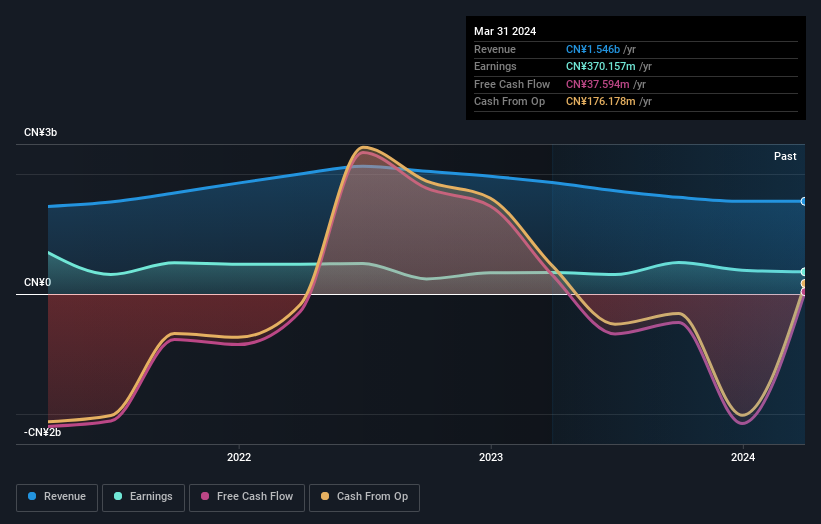- China
- /
- Capital Markets
- /
- SHSE:600621
Private companies among Shanghai Chinafortune Co., Ltd.'s (SHSE:600621) largest shareholders, saw gain in holdings value after stock jumped 3.2% last week

Key Insights
- The considerable ownership by private companies in Shanghai Chinafortune indicates that they collectively have a greater say in management and business strategy
- 55% of the business is held by the top 2 shareholders
- Past performance of a company along with ownership data serve to give a strong idea about prospects for a business
To get a sense of who is truly in control of Shanghai Chinafortune Co., Ltd. (SHSE:600621), it is important to understand the ownership structure of the business. We can see that private companies own the lion's share in the company with 49% ownership. Put another way, the group faces the maximum upside potential (or downside risk).
Clearly, private companies benefitted the most after the company's market cap rose by CN¥446m last week.
Let's take a closer look to see what the different types of shareholders can tell us about Shanghai Chinafortune.
See our latest analysis for Shanghai Chinafortune

What Does The Institutional Ownership Tell Us About Shanghai Chinafortune?
Institutions typically measure themselves against a benchmark when reporting to their own investors, so they often become more enthusiastic about a stock once it's included in a major index. We would expect most companies to have some institutions on the register, especially if they are growing.
We can see that Shanghai Chinafortune does have institutional investors; and they hold a good portion of the company's stock. This can indicate that the company has a certain degree of credibility in the investment community. However, it is best to be wary of relying on the supposed validation that comes with institutional investors. They too, get it wrong sometimes. When multiple institutions own a stock, there's always a risk that they are in a 'crowded trade'. When such a trade goes wrong, multiple parties may compete to sell stock fast. This risk is higher in a company without a history of growth. You can see Shanghai Chinafortune's historic earnings and revenue below, but keep in mind there's always more to the story.

Hedge funds don't have many shares in Shanghai Chinafortune. INESA (Group) Co., Ltd. is currently the largest shareholder, with 47% of shares outstanding. With 8.0% and 1.2% of the shares outstanding respectively, Shanghai Guosheng Group Co., Ltd. and Guotai Asset Management Company Limited are the second and third largest shareholders.
A more detailed study of the shareholder registry showed us that 2 of the top shareholders have a considerable amount of ownership in the company, via their 55% stake.
While it makes sense to study institutional ownership data for a company, it also makes sense to study analyst sentiments to know which way the wind is blowing. We're not picking up on any analyst coverage of the stock at the moment, so the company is unlikely to be widely held.
Insider Ownership Of Shanghai Chinafortune
The definition of an insider can differ slightly between different countries, but members of the board of directors always count. Management ultimately answers to the board. However, it is not uncommon for managers to be executive board members, especially if they are a founder or the CEO.
Insider ownership is positive when it signals leadership are thinking like the true owners of the company. However, high insider ownership can also give immense power to a small group within the company. This can be negative in some circumstances.
We note our data does not show any board members holding shares, personally. Not all jurisdictions have the same rules around disclosing insider ownership, and it is possible we have missed something, here. So you can click here learn more about the CEO.
General Public Ownership
With a 38% ownership, the general public, mostly comprising of individual investors, have some degree of sway over Shanghai Chinafortune. This size of ownership, while considerable, may not be enough to change company policy if the decision is not in sync with other large shareholders.
Private Equity Ownership
With a stake of 8.0%, private equity firms could influence the Shanghai Chinafortune board. Some might like this, because private equity are sometimes activists who hold management accountable. But other times, private equity is selling out, having taking the company public.
Private Company Ownership
Our data indicates that Private Companies hold 49%, of the company's shares. It might be worth looking deeper into this. If related parties, such as insiders, have an interest in one of these private companies, that should be disclosed in the annual report. Private companies may also have a strategic interest in the company.
Next Steps:
I find it very interesting to look at who exactly owns a company. But to truly gain insight, we need to consider other information, too. For instance, we've identified 2 warning signs for Shanghai Chinafortune (1 can't be ignored) that you should be aware of.
If you would prefer check out another company -- one with potentially superior financials -- then do not miss this free list of interesting companies, backed by strong financial data.
NB: Figures in this article are calculated using data from the last twelve months, which refer to the 12-month period ending on the last date of the month the financial statement is dated. This may not be consistent with full year annual report figures.
New: Manage All Your Stock Portfolios in One Place
We've created the ultimate portfolio companion for stock investors, and it's free.
• Connect an unlimited number of Portfolios and see your total in one currency
• Be alerted to new Warning Signs or Risks via email or mobile
• Track the Fair Value of your stocks
Have feedback on this article? Concerned about the content? Get in touch with us directly. Alternatively, email editorial-team (at) simplywallst.com.
This article by Simply Wall St is general in nature. We provide commentary based on historical data and analyst forecasts only using an unbiased methodology and our articles are not intended to be financial advice. It does not constitute a recommendation to buy or sell any stock, and does not take account of your objectives, or your financial situation. We aim to bring you long-term focused analysis driven by fundamental data. Note that our analysis may not factor in the latest price-sensitive company announcements or qualitative material. Simply Wall St has no position in any stocks mentioned.
About SHSE:600621
Shanghai Chinafortune
Through its subsidiaries, operates in the financial services industry.
Acceptable track record with mediocre balance sheet.

